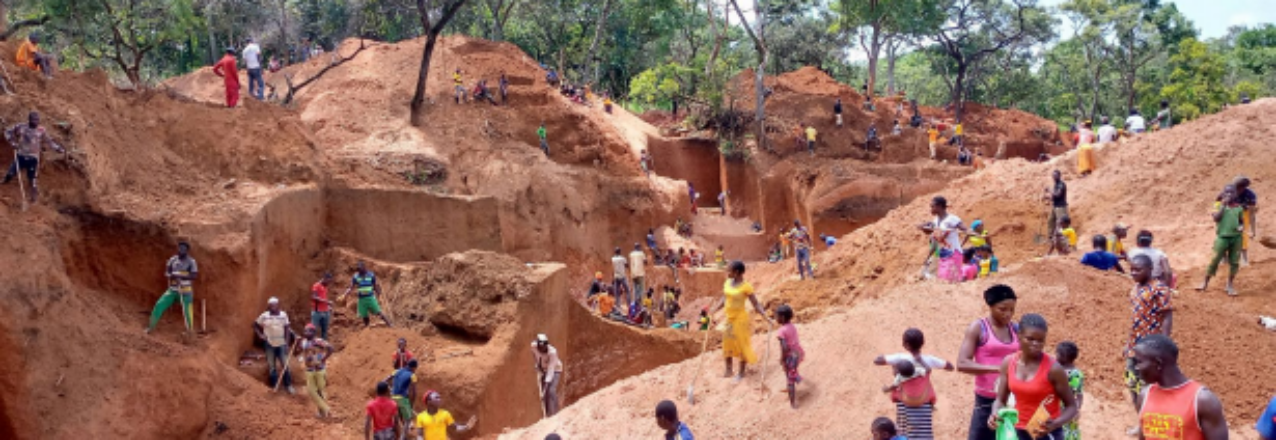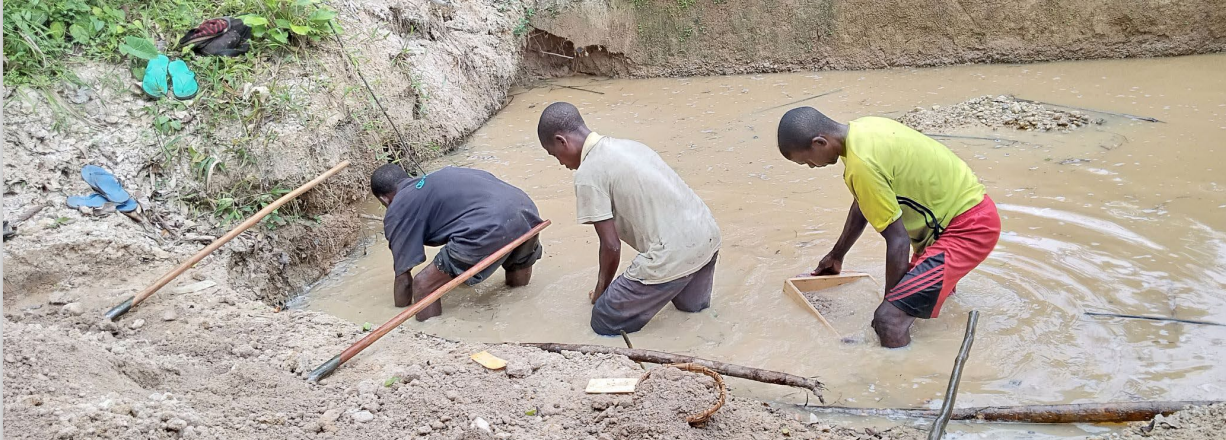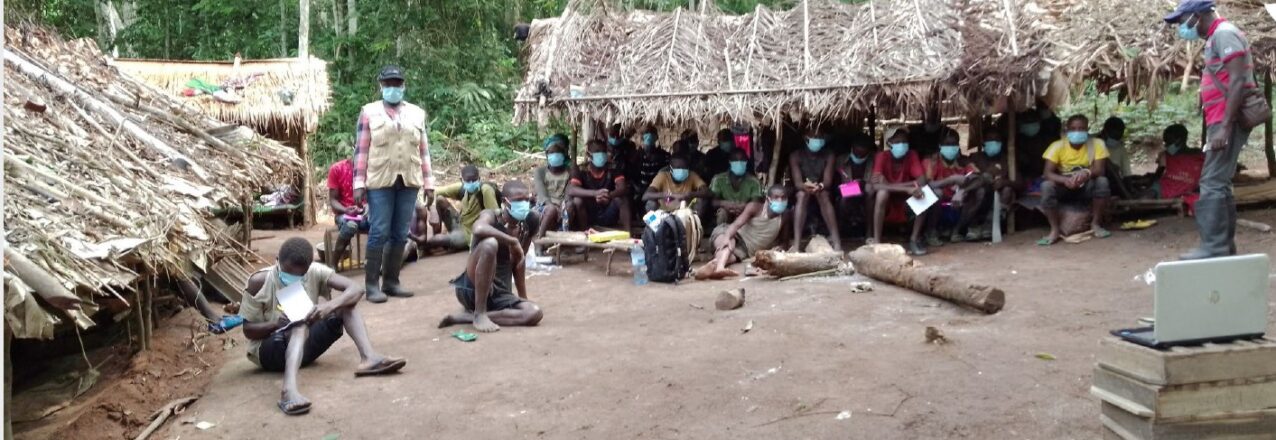Key Accomplishments and Challenges
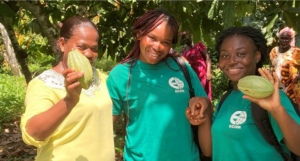 Mozambique: During the quarter, ILRG finalized its work with Green Resources AS (GRAS) in Zambezia and Niassa, and continued engagement with Grupo Madal on agricultural extension and land administration, with Green Resources on land delimitation and community management of forests, and on land administration in the context of disaster risk reduction in Sofala. During the quarter, the new National Land Policy was approved, including language underscoring the rights of communities to document local rights according to customary norms. With Grupo Madal, ingrower farmers were supported in raising coconut palms for upcoming planting. Within the outgrower areas, almost 1,000 new parcels were delimited. In the community forest management work, ILRG’s partner is helping the communities inventory their resources and plan for upcoming use of their plantation forests. ILRG supported the updating of previously delimited community lands in Ntacua. In Sofala, awareness-raising meetings were held alongside initial vulnerability mapping. ILRG is working with Terra Nossa to update its plans on disaster risk training. ILRG also began supporting the development of a public geoportal that will accept and show details of community land delimitations.
Mozambique: During the quarter, ILRG finalized its work with Green Resources AS (GRAS) in Zambezia and Niassa, and continued engagement with Grupo Madal on agricultural extension and land administration, with Green Resources on land delimitation and community management of forests, and on land administration in the context of disaster risk reduction in Sofala. During the quarter, the new National Land Policy was approved, including language underscoring the rights of communities to document local rights according to customary norms. With Grupo Madal, ingrower farmers were supported in raising coconut palms for upcoming planting. Within the outgrower areas, almost 1,000 new parcels were delimited. In the community forest management work, ILRG’s partner is helping the communities inventory their resources and plan for upcoming use of their plantation forests. ILRG supported the updating of previously delimited community lands in Ntacua. In Sofala, awareness-raising meetings were held alongside initial vulnerability mapping. ILRG is working with Terra Nossa to update its plans on disaster risk training. ILRG also began supporting the development of a public geoportal that will accept and show details of community land delimitations.
Zambia: In Zambia, ILRG convened two high profile community-based natural resource management (CBNRM) events on community forest management and on wildlife, which brought together diverse stakeholders to advance community partnerships with government on resource management. During the quarter, partner Wildlife Producers Association of Zambia (WPAZ) launched a national report on the status of the wildlife economy. ILRG continued to coordinate with a diverse group of wildlife management partners on combating gender-based violence (GBV) and increasing women’s effective participation in resource governance. The first cohort of chiefs completed the Chalimbana University Diploma on Traditional Leadership. With respect to land rights documentation, ILRG neared completion of documentation of rights within the wildlife areas of Chikwa and Chifunda Chiefdoms and completed a customary land administration information management system that will be rolled out with chiefdom secretariats in the coming quarter.
Ghana Deforestation-Free Cocoa: ILRG organized a final event in November, a workshop on the economic analysis of tree tenure. There was considerable momentum behind the imperative for tree tenure devolution, but the government remains skeptical of the feasibility of natural tree regeneration and seems to still prefer the mass distribution of seedlings without accompanying reforms.
India: This quarter marked the beginning of the potato season in West Bengal. ILRG continued to provide agronomy training to women farmers, including training on PepsiCo’s sustainable farming practices (SFPs) and potato package of practices (POP). A key accomplishment was that this year seven PepsiCo Agronomists started to deliver training to women independently, reaching 497 women farmers in 31 communities. Seven women’s land leasing groups (LLGs) and 11 women-led demonstration farms have planted potatoes and are receiving ongoing mentoring and support. ILRG partner Landesa provided land literacy training to 648 people (470 women and 178 men). ILRG provided ongoing training and mentoring to all Community Agronomists (CAs) and Field Agronomists, including off-season refresher training on gender equality and data collection. This season farmers are facing challenges with seed quality across West Bengal, with some farmers opting to plant table potatoes instead. PepsiCo is responsive to the issue, replacing seeds as possible, adjusting the cost, and providing recommendations to treat seed disease. As this is the final year of intervention, ILRG is focusing on data collection and analysis to make the business case for women’s empowerment. ILRG completed a pre-season survey in all 11 target communities and 29 communities where PepsiCo Agronomists are delivering agronomy training. ILRG continued to strengthen the capacity of PepsiCo local staff, distributing “how-to guides “on different interventions and orientation/support on POP training methodologies.
Liberia: In Liberia, ILRG continued support to the community lands protection process through grants to Green Advocates International (GAI) and Foundation for Community Initiatives (FCI) for work in 13 communities. Delays in finalizing the boundary agreements in Nimba County resulted from last-minute demands from community members for rechecking the boundaries. Traditional leaders are working to resolve any last-minute issues before work can be completed.
Malawi: ILRG has completed parcel documentation work in 20 group village headpersons (GVHs) in Traditional Authority (TA) Mwansambo and work continues in the remaining three new GVHs. Public display has begun in all 18 original GVHs, allowing community members to verify that the information collected during documentation is correct. Public display is complete in six GVHs, and ongoing in ten. Work in the remaining two GVHs is stalled due to a boundary dispute between the two communities while ILRG awaits resolution by the district land tribunal (DLT). Community land committees (CLCs) were elected in the five new GVHs and received training from both the Land Reform Implementation Unit (LRIU) and the ILRG gender consultant on the land documentation process and gender and social inclusion. This complements ongoing sensitization work by community gender champions as well as community radio programming with LRIU staff and traditional leaders.
Ghana WEE: The ECOM Ghana gender equality and social inclusion (GESI) strategy was finalized and successfully launched; next quarter, the Gender and Sustainability Specialist will meet with management staff in Ghana to share the 2023 implementation plan for the strategy to ensure that GESI activities are integrated into all business units’ annual work plans. Using the updated Good Social Practices (GSP) training manual that was revised with support from ILRG, ECOM continue to train farmers on harmful gender norms, land rights, and GBV, reaching 262 men and 425 women this quarter for a total of 1,521 farmers (405 men and 1,116 women) since the beginning of the activity. A total of 47 women’s village savings and loan associations (VSLAs) were established and trained, with 1,202 members. Over this quarter, the 47 VSLAs saved United States dollars (USD) 27,379.40 (USD 43,049.88 cumulative) and disbursed USD 24,370.92 (USD 29,777.88 cumulative) in loans to members. ECOM is supporting women planting alternative crops (maize and chili) and partnered with the Business Advisory Center (BAC) to conduct a needs assessment with the VSLAs to determine livelihood activities best suited for them and the area. To provide women with the skills needed to succeed as entrepreneurs, ECOM trained 860 women this quarter (1,003 women since the beginning of the activity).
WEE Crosscutting: A total of 12,677 women were reached this quarter, and 230,271 women have been reached by WEE-funded activities so far. During this quarter, the ILRG global Gender Advisor continued to provide technical support to local gender and social inclusion advisors, implementing partners, and grantees across all ILRG countries. WEE crosscutting communications efforts were centered around two key days: International Rural Women’s Day and 16 Days of Activism Against Gender-Based Violence.
Madagascar: ILRG helped to facilitate the provision of land titles under the opération domaniale concentrée (ODOC), or mass land titling operation, in six communes of Ambanja District; the operation’s methodology has thus far reflected a commitment to upholding social and environmental safeguards like the inclusion of women’s names on land titles and careful mapping of the boundaries of protected natural areas. The long-term sustainability of the Sambirano Watershed Management Committee’s (COGEBS’s) support for resource rights seems tenuous, however, and some local stakeholders expressed frustration with what they perceived to be a lack of sufficient communication about the details of the ODOC (which is being undertaken in the area by the government, unrelated to ILRG), despite a series of radio broadcasts in late November to attempt to answer common questions about the process.
Other Activities: ILRG identified a new partner to support the free, prior, and informed consent (FPIC) online training module development. With a slight delay, the work will continue early in 2023. The PPA submitted its final activity report and finalized a memorandum of understanding (MOU) with its United States government (USG) and private sector counterparts for a PPA III activity running from 2022–2027. ILRG subcontractor International Peace Information Service (IPIS) made progress on its fourth cycle of data collection on roadblocks and armed groups in mining communities in eastern DRC as well as a series of case studies on conflict financing. Progress was hampered by a deteriorating security situation, particularly in North Kivu province, where rebel group M23 has made gains in recent months.


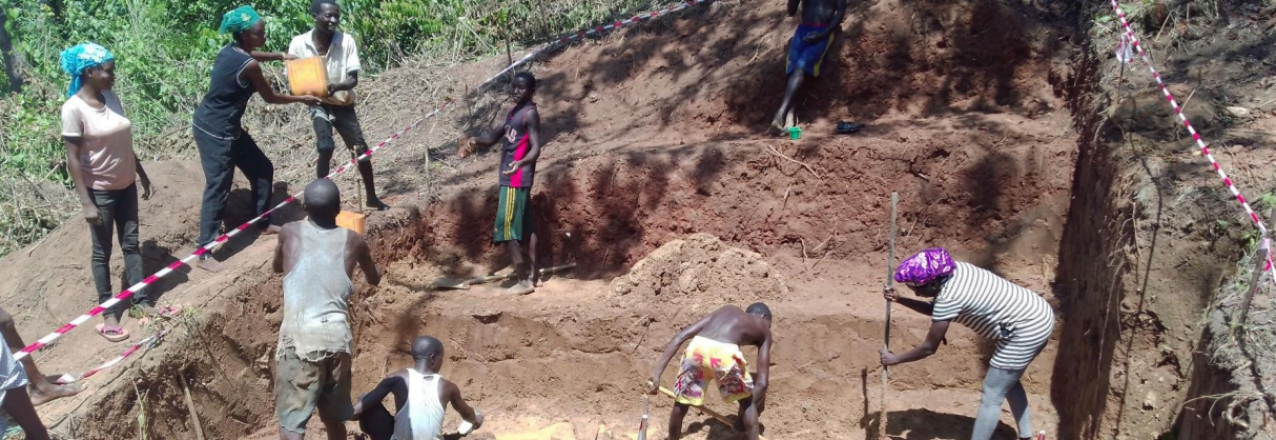
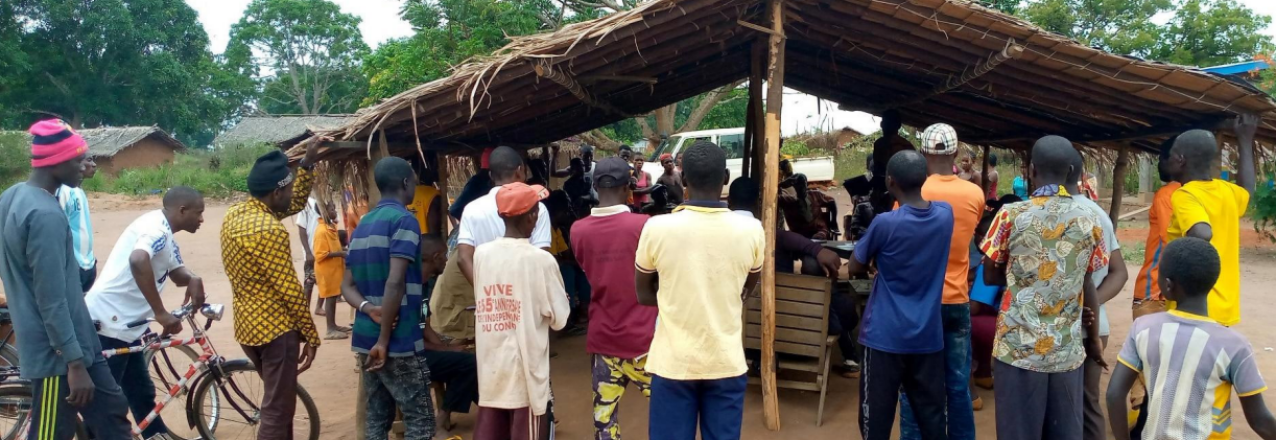
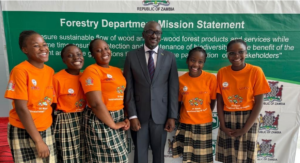 Mozambique: During this quarter, several implementing partners were able to make significant progress on association recognition and land delimitation, but Cyclone Freddy caused delays across all activities. The Madal agricultural extension initiative and the delimitation of neighboring communities outside of Quelimane were both fully stopped for two weeks while the implementers and the communities focused entirely on recovery from the storm and flooding. Up to 90 percent of homes in the communities next to Madal were destroyed, and a large portion of crops that had been planted in the Madal activity were devastated. However, all service providers quickly took stock of the damage and modified their plans, and work was back underway at the end of March.
Mozambique: During this quarter, several implementing partners were able to make significant progress on association recognition and land delimitation, but Cyclone Freddy caused delays across all activities. The Madal agricultural extension initiative and the delimitation of neighboring communities outside of Quelimane were both fully stopped for two weeks while the implementers and the communities focused entirely on recovery from the storm and flooding. Up to 90 percent of homes in the communities next to Madal were destroyed, and a large portion of crops that had been planted in the Madal activity were devastated. However, all service providers quickly took stock of the damage and modified their plans, and work was back underway at the end of March. Mozambique: During the quarter, ILRG finalized its work with Green Resources AS (GRAS) in Zambezia and Niassa, and continued engagement with Grupo Madal on agricultural extension and land administration, with Green Resources on land delimitation and community management of forests, and on land administration in the context of disaster risk reduction in Sofala. During the quarter, the new National Land Policy was approved, including language underscoring the rights of communities to document local rights according to customary norms. With Grupo Madal, ingrower farmers were supported in raising coconut palms for upcoming planting. Within the outgrower areas, almost 1,000 new parcels were delimited. In the community forest management work, ILRG’s partner is helping the communities inventory their resources and plan for upcoming use of their plantation forests. ILRG supported the updating of previously delimited community lands in Ntacua. In Sofala, awareness-raising meetings were held alongside initial vulnerability mapping. ILRG is working with Terra Nossa to update its plans on disaster risk training. ILRG also began supporting the development of a public geoportal that will accept and show details of community land delimitations.
Mozambique: During the quarter, ILRG finalized its work with Green Resources AS (GRAS) in Zambezia and Niassa, and continued engagement with Grupo Madal on agricultural extension and land administration, with Green Resources on land delimitation and community management of forests, and on land administration in the context of disaster risk reduction in Sofala. During the quarter, the new National Land Policy was approved, including language underscoring the rights of communities to document local rights according to customary norms. With Grupo Madal, ingrower farmers were supported in raising coconut palms for upcoming planting. Within the outgrower areas, almost 1,000 new parcels were delimited. In the community forest management work, ILRG’s partner is helping the communities inventory their resources and plan for upcoming use of their plantation forests. ILRG supported the updating of previously delimited community lands in Ntacua. In Sofala, awareness-raising meetings were held alongside initial vulnerability mapping. ILRG is working with Terra Nossa to update its plans on disaster risk training. ILRG also began supporting the development of a public geoportal that will accept and show details of community land delimitations.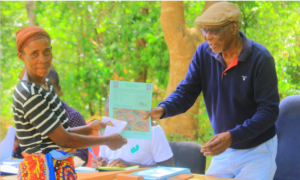 Mozambique: ILRG supported the National Land Policy review, including comments that were made in subsequent drafts. ILRG continued to advocate for Mobile Approaches to Secure Tenure (MAST) for land registration, including a technical meeting with the National Directorate of Land to compare MAST approaches with the MozLand methodology. ILRG completed initial work with Grupo Madal and launched subsequent work on gender and support to agricultural extension and further community delimitation. ILRG also neared completion of work with Green Resources SA (GRAS) on land disinvestment and continued to support community associations on capacity to manage forests. Finally, ILRG finalized agreements in Sofala related to managing displaced communities, which included de-emphasizing household delimitation and focusing on land use planning.
Mozambique: ILRG supported the National Land Policy review, including comments that were made in subsequent drafts. ILRG continued to advocate for Mobile Approaches to Secure Tenure (MAST) for land registration, including a technical meeting with the National Directorate of Land to compare MAST approaches with the MozLand methodology. ILRG completed initial work with Grupo Madal and launched subsequent work on gender and support to agricultural extension and further community delimitation. ILRG also neared completion of work with Green Resources SA (GRAS) on land disinvestment and continued to support community associations on capacity to manage forests. Finally, ILRG finalized agreements in Sofala related to managing displaced communities, which included de-emphasizing household delimitation and focusing on land use planning.

